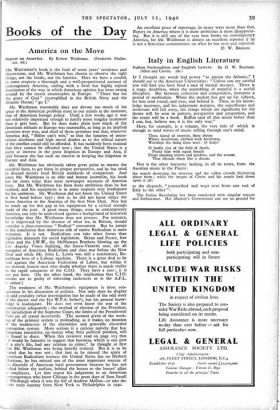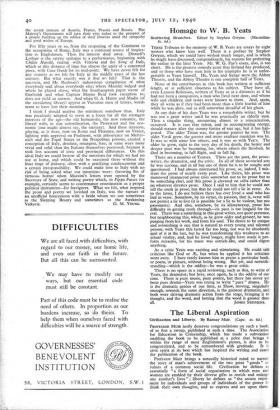Italy in English Literature
Italian Nationalism and English Letters. By H. W. Rudman. (Allen and Unwin. t8s.)
IF I thought my words had power " to pinion the Atlantic," I should say to the American Universities: " Unless you are careful you will find you have bred a race of mental myopes. There is a stage, doubtless, when the assembling of material is a useful discipline. But between collection and composition, interpose a period of meditation. When the student has got up his subject, let him read round, and over, and behind it. Then, as his know- ledge increases, and his judgement matures, the superfluous and irrelevant will fall away, the things which are significant for the theme will be seen in pattern, perspective and proportion, and the result will be a book. Buffon said all this much better than I can, but, believe me, it is the only way."
Here, for example, is a volume, the very title of which is enough to send waves of music rolling through one's mind.
Thou island of eternity, thou shrine Where desolation, clothed with loveliness, Worships the thing thou wert: 0 Italy!
0 lordly city of the field of death, Praise him with equal breath From sleeping streets and gardens, and the stream That threads them like a dream.
Nor is the other harmony lacking, in all its tones, from the Austrian music in the Piazza :
the march drowning the miserere and the sullen crowds thickening about them ; while the images of Christ and his angels look down upon it all:
to the dispatch, " transcribed and wept over from one end of Italy to the other ":
The Italian Revolution has been conducted with singular temper and forbearance. Her Majesty's Government can see no ground for the severe censure of Austria, France, Prussia and Russia. Her Majesty's Government will turn their eyes rather to the prospect of a people building up the edifice of their liberties amid the sympathy And good wishes of Europe.
For fifty years or so, from the reopening of the Continent to the occupation of Rome, Italy was a continual source of inspira- tion to Englishmen. Then the interest died away. Disraeli's Lothair is the satyric epilogue to a performance, beginning with Childe Harold, ending with Vittoria and the Song of Italy, which at this distance of time has almost the unity of a concerted piece, with Casa Guidi for its mid-point. We have never felt for any country as we felt for Italy in the middle years of the last century. But what exactly was it that we: felt? That is the question, and Mr. Rudman's industrious compilation of what everybody said about everybody else; where Mazzini lodged and where he played chess; what the Southampton paper wrote of Garibaldi and what Captain Mayne Reid took exception to; does not yield an answer. And when G. A. Henry and Mudie (of the circulating library) appear as Victorian men of letters, words seem to have lost their meaning.
I think I should analyse the sentiment somehow thus. Italy was peculiarly adapted to serve as a focus for all the strongest interests of the age—the old humanistic, the new romantic, the liberal with, in due subordination, the Protestant and the eco- nomic (one might almost say, the sanitary). And these interests, playing, as it were, now on Rome and Florence, now on Venice, lighting with approval on Piedmont, with abhorrence on Metter- nich and the Papal States or the Neapolitan prisons, created a conception of Italy, desolate, resurgent, free; in some ways more vivid and solid than the Italians themselves possessed, because it took less account of civic and provincial differences. On this ideal Italy we could bestow all the emotions for which we had no use at home, and which could be exercised there without the least tinge of jealousy, often with a gratifying condescension and a certain irresponsibility. We could make love to Italy with no risk of being asked what our intentions were: throwing fits of virtuous horror when Mazzini's letters were opened by the Secretary of State, and writing poetry which, in Pippa Passes for example, certainly seems to countenance assassination as a proper political instrument—for foreigners. What we felt, what inspired the prose and poetry we lavished on Italy, was the rapture of an unofficial honeymoon with a bride whom we saw sometimes as the Sleeping Beauty and sometimes as the Awakening



























 Previous page
Previous page